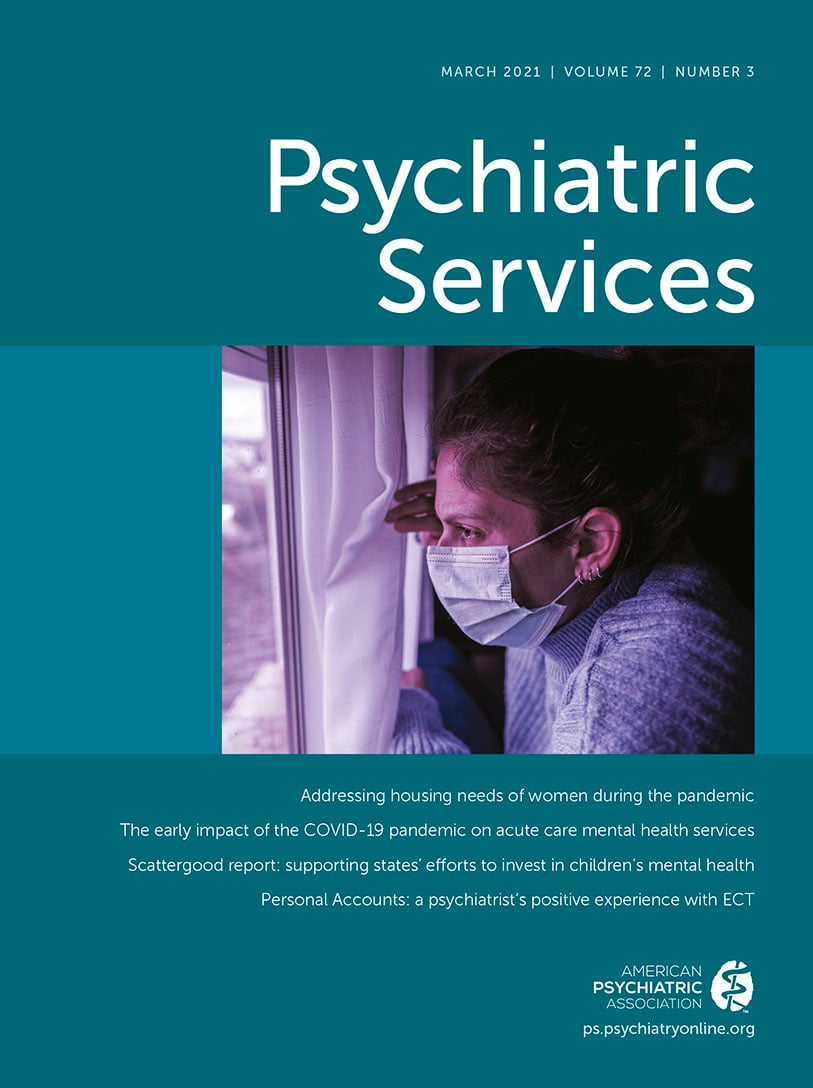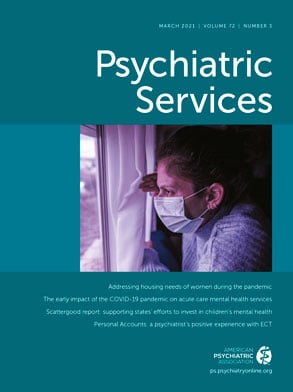I always thought of myself as a good psychiatrist, actually a very good psychiatrist. I saw much improvement in almost all of my patients and could control each person’s symptoms with psychopharmacological medications and with psychotherapy, which I loved to do. I never had to refer more than about 1% of my large patient population to hospitals, even though some of my patients were very ill. I could maintain treatment on an outpatient basis, and, in my 34 years of private practice, I never had a patient commit suicide. Now I am 71 years old and have been retired 8 years. Yet I realize now that despite having been a board-certified psychiatrist and a Life Fellow of the American Psychiatric Association, I was ignorant about something very important—the full range of patients who could receive the broad spectrum of benefits from electroconvulsive therapy (ECT). I rarely referred patients for ECT and always thought of it as a last resort. I was not sufficiently knowledgeable of the benefits of ECT until I myself was the beneficiary.
My husband died in the fall of 2019 after struggling for 9 years with progressive mental and physical decline from Parkinson’s disease. During those last 2–3 years, I developed symptoms of clinical depression, which became quite severe and were disturbing to both of us. I never felt suicidal, but I became extremely indecisive and lost my joie de vivre, my ability to experience pleasure, and my motivation; most important, I lost my resilience. Everything took such effort. I tried three antidepressants, but I could not tolerate their adverse effects and quit them before they could have conferred any benefit. I felt very discouraged and disheartened, especially when my primary care physician told me that my psychiatric symptoms were above and beyond his level of knowledge or training and that he did not have a clue how to help me. It made me feel that something was terribly wrong with me. Despite good insights from psychotherapy, I knew deep inside that my depression was not really getting better, but finally it improved for a few months. Nonetheless, my symptoms returned and got progressively worse during the last few months of my husband’s life. This time, no matter how good the insights were from psychotherapy, my depression only went downhill, especially after my husband’s death, and my cognition became so adversely affected that I developed irrational thoughts.
My family was very worried about me, and I received daily phone calls from concerned siblings, as well as two cross-country visits from one of my sisters. I was too embarrassed to fully seek the medical help I needed. I was certainly not going to go to any local psychiatric hospital because I did not want people who had been my colleagues to see my level of debilitation after my husband’s death. Yet I was unable to accomplish much of anything as I just stared into space, feeling very overwhelmed by everything I needed to do. I was repeatedly urged by my brothers and sisters to agree to hospitalization, and they even sought out places for me that would respect my privacy. One of my sisters-in-law did some research and finally learned that Sheppard Pratt Hospital in Baltimore had one of the finest psychiatric units in the country. When she and my brother flew across the country to drive me to Baltimore to be admitted, I offered no resistance.
I was assigned to a wonderful psychiatrist who, after a thorough initial evaluation, recommended I get ECT. I was indignant at his suggestion because none of the five doctors I had previously consulted who knew that I was depressed had ever suggested I needed ECT. And I certainly was too impaired myself to recognize that I needed ECT. I was scared by the suggestion because I knew very little about the treatment, despite my training and despite my many continuing medical education courses in which ECT would inevitably be mentioned but never emphasized. I had thought it should be reserved just for the absolute sickest of the sick—which I did not consider myself to be. But my psychiatrist said in a very reassuring voice that it would certainly turn my symptoms around faster than anything else and that I needed to trust him because he would not have recommended it if he did not genuinely believe it would help me. Finally, after many days of resistance, I signed the consent form to undergo ECT.
It took only three ECT treatments to totally turn around my depression and to stop whatever irrational thoughts had developed. I was more sensitive to the ECT treatment, resulting in seizures induced by the treatment that were longer than the seizure lengths typically achieved with ECT. This greater sensitivity had the advantage of making each treatment maximally effective in improving my mood but had the disadvantage of causing more post-ECT disorientation (i.e., when asked where I was, I would say “Tucson” instead of Baltimore). But my orientation improved each day, and the confusion finally disappeared completely. I have no memory of the actual ECT treatment because a general anesthetic and a short-acting benzodiazepine had suppressed any memories during the treatment. I never felt the seizure and had no later discomfort from it. On awakening from the general anesthetic, I was wheeled back to the psychiatric unit, whereupon I could eat a meal that had been delayed until after the treatment because of the general anesthesia.
Once my symptoms of clinical depression disappeared, which they did very rapidly, I could take pleasure in life, regaining my joie de vivre, my high level of motivation, and my ability to make decisions, and I once again had my resilience back. I no longer felt overwhelmed and could accomplish whatever I needed to do. What a difference a change in brain chemistry made!
The positive experience made me think that maybe I could do some good by writing this article and by recognizing that perhaps ECT is underutilized and should be considered more frequently as a treatment option than it usually is. After all, I now reap only the benefits of ECT and have no adverse effects at all. And for that I am very fortunate, because I had the best possible outcome. I realize that for too many people—for both patients who might be candidates for ECT and the doctors treating them—ignorance about the benefits of ECT and a persistent stigma may cause them to oppose the treatment. Even doctors who do not themselves “do ECT” or are not psychiatrists should have at least some basic understanding of the procedure and the types of patients who could benefit. When such a patient presents in their practice, they would then know to refer him or her to a more qualified specialist for evaluation for ECT. The patient will need a thorough discussion with the specialist so that the patient can gain a genuine understanding of both the benefits and risks of ECT and can be a partner with the physician in a shared decision-making process to decide on what might be the optimal treatment. Whenever a procedure is less mysterious, it is more acceptable. Mostly, stigma about any disease or any treatment occurs out of ignorance. For any of us, accurate knowledge and dialogue are essential in replacing the obstacles of fear and stigma. Even I, a doctor, desperately needed that thorough dialogue when I was in the role of being the patient. It enabled me, after several days of deliberation, to finally be willing to consent to ECT, a procedure that truly gave me my life back!
I would like to add that even when a doctor might feel a wall of resistance in discussions with a patient highly ambivalent about any treatment option, including ECT, the patient might become more understanding and accepting over time. With each day of more discussion, of more information being absorbed, and of more seeds being planted in the patient’s mind, arguments that might have been flatly rejected initially might become more understandable and acceptable to the patient several days later. I was given supplemental articles that were helpful for me to read and reach a decision. Some excellent websites educate patients about ECT, including
Because everything we learn helps to refine questions we can ask our treating physicians, we as patients become more empowered by this learning process to make the right decisions for ourselves.
If reading these thoughts can help even one more patient who needs ECT accept it or help one more physician to consider recommending it when appropriate, I will have accomplished my goal of helping to destigmatize ECT. It may not help everybody who has severe depressive symptoms, but in the hands of competent physicians, it can be a remarkably fast-acting, effective, and safe treatment option for clinical depression. As I mentioned at the start, as a practicing psychiatrist, I only rarely referred patients for ECT. But on the basis of my own experience, I now can see that for some patients ECT should be considered sooner and not just as a last resort. I wish I had gained that realization before I retired. I still think I was a good psychiatrist, but I would have been an even better one if, at the time, I had more fully recognized and appreciated the full range of patients who could benefit from ECT.

